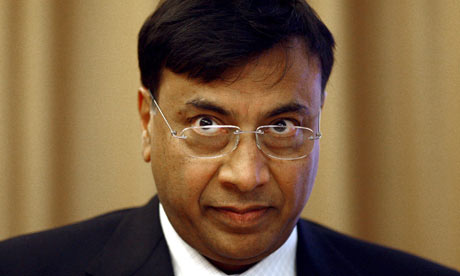
In India, the rich just got richer. Despite one of the worst global recessions in history, the number of billionaires in the subcontinent has almost doubled since last year.
Figures show that there are now 52 billionaires in India, compared with 27 last year.
Over the course of the year, the stock market has gained more than 75% and the economy has grown at almost 7%, pouring billions of dollars into the bank accounts of India's richest people.
But with 0.00001% of India's population now accounting for around a quarter of its trillion-dollar gross domestic product, fierce debate about the polarisation of the country's society has begun.
Mukesh Ambani, the chief of Reliance Industries, India's biggest private company, remains its richest person with a net worth of around $32bn (£19.2bn).
He is followed by the London-based steel baron Lakshmi Mittal, with $30bn, with the net worth of both men rising by half.
Ambani's estranged brother, Anil, was India's third wealthiest person, with a fortune of $17.5bn.
The combined wealth of India's 100 richest people was put at $276bn – considerably more than China's 100 wealthiest, who have $170bn.
These two Asian giants have been the bright spots in the global economy, and analysts expect India, Asia's third-biggest economy, to expand by 6.4% next year – the fastest pace among the G20 nations after China.
By contrast, the rich in the US have got poorer. The Microsoft founder, Bill Gates, lost $7bn, shrinking his personal wealth to $50bn.
The investor Warren Buffet was down to his last $40bn, while almost 100 billionaires in the US were reduced to being worth millions last year.
In a sign of how wealthy Indian billionaires are, Mukesh Ambani, whose oil to supermarkets empire is ubiquitous in the country, is now almost three times richer than the Microsoft chief executive officer, Steve Ballmer, a classmate at Stanford University.
There has been increasing concern about the emergence of a super-rich in India, a country in which 800 million people live on 20 rupees (50 cents) a day.
Last month, the corporate affairs minister, Salman Khurshid, called for a cut in the "vulgar" salaries of top bosses in India, who have seen their pay rocket.
Soon after his call for restraint, Reliance announced a 66% pay cut for Mukesh Ambani to "set a personal example of moderation".
The elder Ambani will take home $3.2million) in salary and a share of profits for the year.
However, Professor Abhijet Sen, a leftwing academic who also is a member of the Planning Commission – India's advisory panel on government spending – said: "I am certain that inequality is increasing and nothing is being done to curb grotesque amounts of wealth building up."
He said the government was "sincere about doing something for the poor, but not about capping the rich".
"I can see a major problem, because money is corrupting politics," he added. "People are able to buy power in a way that is not healthy.
"You have to be a millionaire to contest even local elections. So there are problems with rising inequality."
He said that, as a first step, India "should institute a death tax. In America, there are inheritance taxes. This would be a good first step to immediately reducing inequality."
However, other experts say inequality, as measured by the government, has not risen.
"This is just a few headlines, not a serious look about wealth distribution in the general population," Surjit Bhalla, of Oxus investments, said.
"Forbes' billionaire list allows for leftwingers to talk up poverty. The [government] surveys show that, for 20 years, inequality has not risen.
Six women made the rich list, with Savitri Jindal, the head of Jindal Steel, listed as the richest businesswomen in India. Her wealth rose from $2.9bn to $12bn.
Forbes magazine said the list showed India was a land of opportunities.
"Happy days are definitely back again for India's richest," Nazneen Karmali, the India editor of Forbes Asia, said.
"This year's list shows that, when conditions in the financial markets and the economy are right, India has the scale and resources to produce billionaires faster than most countries."
Source: TheGuardian







